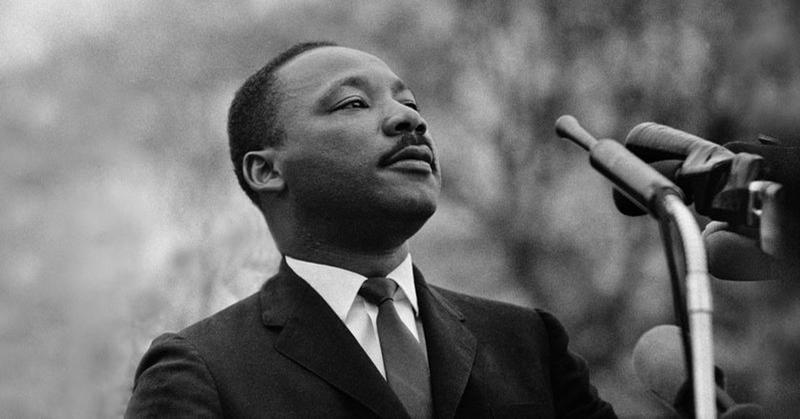Who Assassinated Martin Luther King Jr.?
By | April 11, 2021

Martin Luther King, Jr. was one of the most significant leaders in American history and the preeminent leader of the African-American Civil Rights movement during the 1950s and '60s. His contributions toward American liberty were great, most notably popularizing civil disobedience (a tactic he learned from Mahatma Gandhi) on his own homestead of Montgomery, Alabama after Rosa Parks refused to leave her seat on a segregated bus in 1955. The resulting Montgomery Bus Boycott proved a success, as the courts ruled that bus segregation was in conflict with the 14th Amendment, which promised "equal protection of the laws." Not everyone was happy about it.
Previous Attempts On King's Life
With success came conflict, as King would learn on September 20, 1958, when a young, disturbed woman named Izola Curry attempted to murder King by stabbing him in the abdomen with a letter opener. Following emergency surgery, King spent several weeks in the hospital but eventually made a full recovery, while Curry spent the rest of her life in a psychiatric institution, never deemed competent to stand trial.

That Fateful Day
In 1968, King became heavily involved with the labor movement among sanitation workers in Tennessee, which he hoped would establish a precedent for future labor unions. On April 3, he gave a rousing and disturbingly prophetic speech:
And I've looked over. And I've seen the promised land. I may not get there with you. But I want you to know tonight that we as a people will get to the promised land ... Mine eyes have seen the glory of the coming of the Lord.
Fewer than 24 hours later, King was shot as he stood on the second balcony of his room at the Lorraine Motel in Memphis, Tennessee. He was leaning over the rail when a single bullet struck his lower jaw and neck, traveling through his body before fatally damaging his spine. His friends rushed to his aid, but King lost consciousness immediately, and though he was rushed to a hospital, he was pronounced dead within the hour. Jesse Jackson recalled the event as traumatizing:
To see him lying there soaked in blood, 39 years old ... I remember Ralph Abernathy coming out and saying, 'Get back, my friend, my friend, don’t leave us now,' but Dr. King was dead on impact.

James Earl Ray
Two months later, police arrested fleeing fugitive James Earl Ray at London's Heathrow Airport as he attempted to escape an unrelated prison sentence with a counterfeit Canadian passport. Ray was born in Acton, Illinois on March 10, 1928 and spent a short time in West Germany while serving in the Army before being discharged for bad behavior. He spent most of his youth working low-wage jobs and committing small-time robberies, first sentenced to jail in 1949 for robbing a restaurant. In 1959, while out on parole for one of his many thefts, Ray was sentenced to 20 years in prison for two grocery store robberies but escaped the Missouri penitentiary after only seven.
In 1968, when he was on the lam, he wound up at the same motel as King, where he is believed to have shot King from his bathroom window before fleeing the scene. The police found his fingerprints on a rifle that was discarded in the street only a few blocks from the site of King's murder, and he and his car matched eyewitness descriptions of a man seen fleeing immediately after the shot. It seemed like a pretty open-and-shut case.
Ray even pleaded guilty to the murder, which is why he was never tried, but he recanted only three days later. To the shock of many, he insisted that he was only a tiny part of a much grander conspiracy which included a man named Raoul who was said to have led a gun ring in the area.

Theories About Martin Luther King, Jr.'s Assassin
It didn't take long for conspiracy theorists to get wind of Ray's claims. They chiefly suspected the U.S. government of orchestrating the plot, citing the ongoing harassment King suffered from the F.B.I. as well his contentious relationship with the Memphis police department. F.B.I. Director J. Edgar Hoover seemed to have an especially intense dislike for Dr. King, openly calling him "the most notorious liar in the country" and making several disparaging comments about King's sexual infidelities. Some believe the F.B.I. had reason to take the reverend out due to King's growing Marxist sympathies and the headway he was making in labor rights.
However, the more popular theory is that a man named Lloyd Jowers, a former Memphis cop who owned the shop just below Ray's hotel room, took part in the killing. In fact, he confessed to it in 1993 on ABC's PrimeTime Live, claiming to have also known a man named Raoul who allegedly told him he had planned to "set up where it looked like someone else had done the killing." For cooperating with Raoul, holding the gun, and helping him find a shooter, Jowers says he received over $100,000 dollars.
In 1978, a New York City medical examiner inspected the forensic evidence and reported to a House judiciary committee that the shot indeed could have come from a location other than Ray's window. A little more than 20 years later, Coretta Scott King, the late preacher's wife, actually filed and won a civil suit against Jowers after the court reviewed further evidence and found "others, including government agencies" responsible for King's assassination. The Department of Justice, however, did not find the evidence compelling enough, nor any ties between Jowers and any official government agency, so they continue to implicate Ray as the sole assassin. Ray maintained his innocence until he died on April 23, 1998 from complications of hepatitis C.

